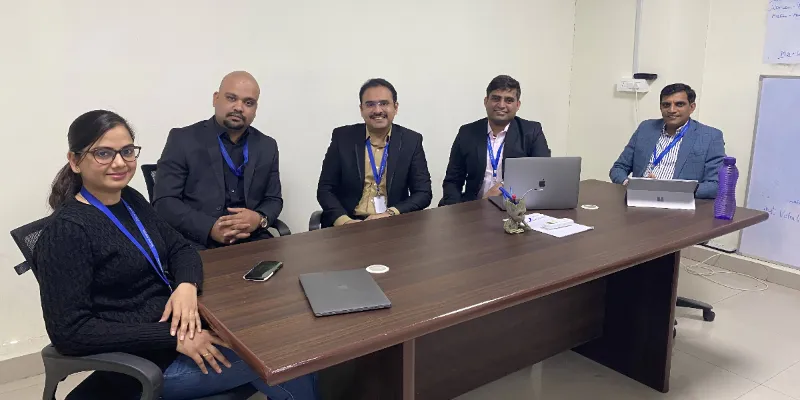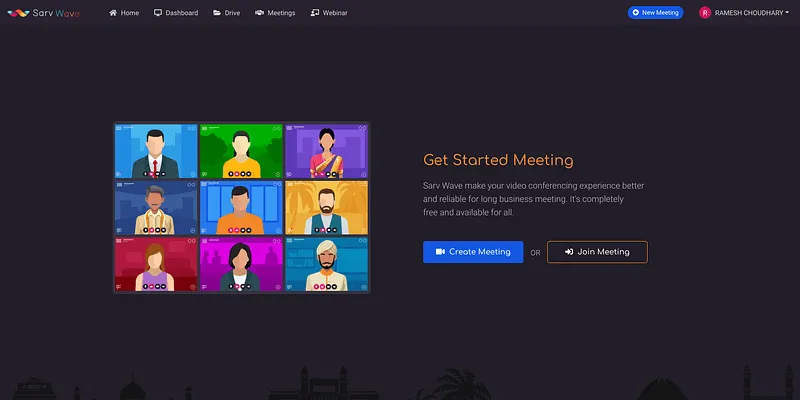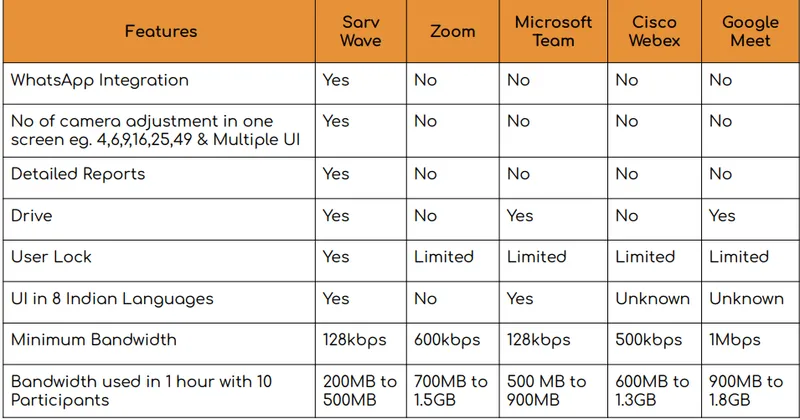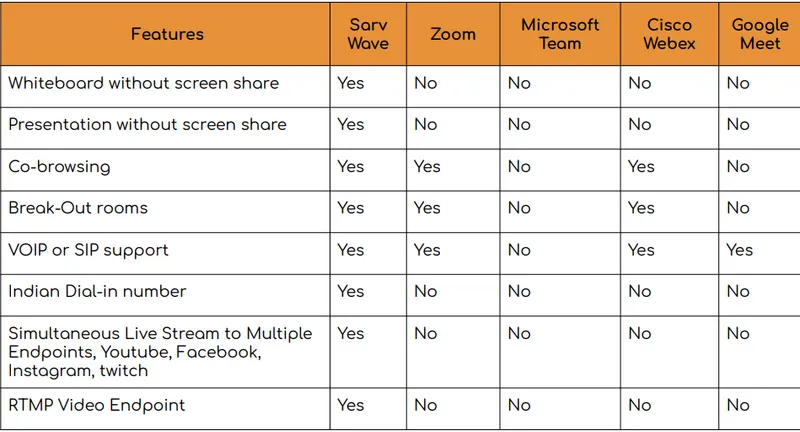Grand Challenge runner-up Sarv Webs enables video conferencing with lesser bandwidth than Zoom
Communication service provider Sarv launched its video conferencing platform, Sarv Wave, to tap into the growing market for online video conferencing tools and provide a solution to the daily problems being faced by the users with the existing applications.
When word got out that user data was not safe with Zoom, the world began looking into viable alternatives to the newly-popular video conferencing brand. In keeping with the government's push for an ‘Aatmanirbhar Bharat’, the Ministry of Electronics and Information Technology (MeitY) announced an innovation challenge for the development of a video conferencing solution under the Digital India initiative.
The three runners-up, which included Webs, were selected from the 2,000 applicants.

Sarv Webs was established by Ramesh Chaudhary and Abhimanyu Sharma in 2011 while pursuing their Master’s in Engineering from Rajasthan University. Sushil Mehla, Preeti Kaushik, and Vivek Sharma later joined the core team as co-founders. [Image Credit: Sarv Webs]
On August 20, Sarv Wave was selected as one of the three potential products at the Grand Challenge for Developing Video Conference Solution by MeitY. As part of the top three, the startup was offered a developmental contract and support of Rs 25 lakh for further development.
Sarv Webs was founded in 2011 by then-students Ramesh Chaudhary and Abhimanyu Sharma while pursuing their Master’s in Engineering at Rajasthan University to provide communication services to different sized businesses. Sushil Mehla, Preeti Kaushik, and Vivek Sharma also joined the core team as co-founders.
Speaking with YourStory, Ramesh Chaudhary, Co-founder and Director of Sarv, said the company launched its video conferencing platform, Sarv Wave, to tap into the growing market for online video conferencing tools and provide a solution to the daily problems faced by the users with the existing applications.
A video conferencing ecosystem and not just a solution
According to Ramesh, Sarv Wave was designed to solve the issues which are constant with the existing solutions and is aimed at “creating a video conferencing ecosystem and not just a solution.”
“In India, networks depend on time and geographical location. We designed the product to fix this issue where users can join the video conference using the given phone number in case of unstable internet. Apart from this, the product also uses machine learning to identify the human voice and suppress all other background noises," he says.
"While using Sarv Wave during online conferences, one can also put music on their system and the sound of it will not reach other members of the event. Apart from noise suppression features and work in unstable internet regions, the product also allows users to make presentations or play video without the screen share option,” Ramesh adds.

On August 20, Sarv Wave was selected as one of the three potential products at the Grand Challenge for Developing Video Conference Solution by the Ministry of Electronics and Information Technology. [Image Credit: Sarv Webs]
On using lesser bandwidth then Zoom or Google Meet
As reported by the company, Sarv Wave requires just 200MB to 500MB bandwidth to host a event for one hour with 10 participants. Compared to this, Zoom requires 700MB to 1.5GB, Cisco Webex needs 600MB to 1.3GB, while Google Meet consumes 900MB to 1.8GB.
Sarv can also reportedly operate at a minimum bandwidth of 128 kbps, while the minimum bandwidth needed by Zoom is 600 kbps, Cisco Webex at 500 kbps, and Google meet at 1 mbps.
The mobile and desktop friendly video conferencing platform can also be used for B2C purposes. According to Ramesh, the team is currently working to allow family members and friends to come together on the platform and watch sports, shows on OTT platforms like Hotstar, or play games.
Multiple social media streaming channels under one platform
Sarv Wave also offers multiple social media streaming channels under one platform. “Users need not integrate the platform separately. The event can be automatically live streamed and shared on platforms like YouTube, Facebook or Instagram with just a single click,” he adds.
The advantages of being browser-based
The product is browser-based and hence there is no need to install any app. The company also claims that Sarv Wave has been designed using Advanced Encryption Standard (AES) 256-bit algorithm (TLS_AES 128_GCM_SHA256, 128 bit keys, TLS 1.3) to provide complete end-to-end encryption of data before the data gets transmitted over internet.


Credit: Sarv Webs
An entrepreneurial streak since school
Ramesh reveals that he wished to have his own company and wanted to be an entrepreneur when he was in Class 10. Coming from a farmer’s family in Rajasthan, Ramesh says that he completed his engineering after taking education loans. Speaking about his journey, he says coming from a farming community helped him follow the principle of “work, earn, and then rest”.
The startup that was launched to provide a unified communication platform to help businesses manage all their communication requirements under one platform, began its journey with email services, and with time expanded to SMS, voice, and interactive voice response (IVR), finally focussing on video conferencing solutions.
“During MTech, we realised the importance of communication for businesses. We wanted to build a company which would offer communication services to businesses of any size and could provide solutions ranging from Rs 500 to Rs 5 Lakh,” Ramesh adds.
The startup works on a SaaS model and provides a web-based login system to users to access a single unified platform where all the communication channels are incorporated along with cross integration among them.
Ramesh also reveals that initially Sarv was headquartered in Delhi, but then it was moved to Jaipur because the team believed that Delhi was more beneficial for sales companies but not so for solution development companies.
“We also realised that Jaipur is well connected with other cities and is extremely rich in terms of human resource availability. Apart from this, the telecom and network infrastructure in Jaipur is excellent, which is important for a communication service company like ours. Jaipur is also one of the best places to build a data centre because the region comes under the zero seismic zone, with lower chances of earthquakes,” he adds.
Speaking about the Aatmanirbhar mission, the co-founder says, “A lot of innovative solutions are being built by Indians, but they are not getting built in India. The Aatmanirbar Bharat initiative has provided a huge opportunity to build solutions within India and for India. In the online video conferencing segment, I believe India will not need any international solutions and will have its own products soon.”
‘Searching’ for future opportunities
Launched earlier this month, the video conferencing platform claims to have 12,000 users. Currently, the platform is available for free and any number of users can sign up and use the platform. The platform can currently host up to 250 users in one conference.
“The product is under development and thus it is currently available for free. Probably after six months or so, when the platform gets further developed and we feel satisfied with it, we will opt for a subscription-based model similar to Zoom,” Ramesh says. He also reveals the bootstrapped startup is in talks with VCs for its first round of funding.
Speaking about future plans, apart from further developing the video conferencing platform, the company is also looking to launch its own search engine, Enquiry.ai, and the team is working on this project. According to the co-founder, the beta version has already been launched, but the official launch has been postponed due to COVID-19, and also because they are prioritising the video conferencing solution.
(Edited by Ryan Frantz)









